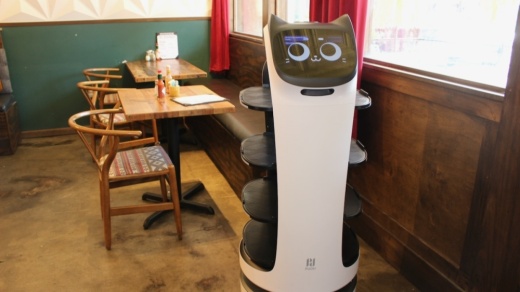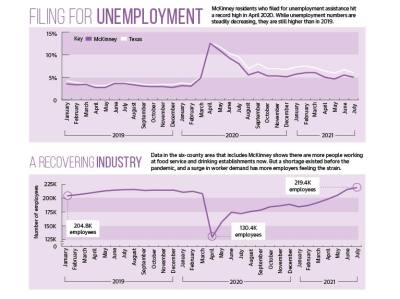As more businesses struggle to hire staff, especially those in the service industry, companies are willing to go to new lengths to find workers or overcome the shortage.
In January 2020, nearly 211,000 employees were working in food service and drinking establishments throughout the six-county area that includes McKinney, according to U.S. Bureau of Labor Statistics data.By April 2020, that figure dropped to almost 130,000 workers. As of July this year, service industry employee numbers had climbed back to more than 219,000. Despite surpassing pre-pandemic numbers, many local employers say it remains difficult to find workers to keep up with rebounding demand.
Lisa Hermes, McKinney Chamber of Commerce president and CEO, said a workforce shortage existed before COVID-19 but was made worse by the pandemic.
“It’s not going to change overnight,” she said. “I think this is a more complex issue that was years in the making. And COVID[-19] just really did not help. It made the challenges even more real.”
For some McKinney residents, Hermes said trouble finding child care and reliable transportation, as well as the rising cost of housing, are affecting the return to work. Even before the pandemic, she said many service industry employers in McKinney often hired workers who lived in areas with more affordable housing options.
Courtney Coss, the chief retail officer for 16 branch locations of the Credit Union of Texas, said multiple branches are short-staffed, including those in McKinney and Frisco.
Many of the openings are remote or over the phone, which is more attractive to people these days, Coss said. And the credit union has attracted former retail and restaurant workers looking to transition to a different career. And yet, multiple locations for the credit union are still short-staffed.
“We really are just trying to staff up, because it has been so challenging ever since last year,” she said.
Increased competition
Elaine Krazer is preparing to open a new coffee concept at the historic flour mill in east McKinney. She operates TexaKona Coffee Roasters on McDonald Street in McKinney. This new concept will expand on the store and add a second location.
She just needs to find the people to staff it, she said.
“They [the workforce] have more choice,” she said. “[There are] so many jobs out there that employees now can pick and choose. They don’t have to take the one that’s just close by.”
She said everybody, including her store, “tightened their belts” last year when it came to staff. But business came back “with a vengeance.” People used to ask regularly about job openings, she said. Now that is not the case.
“It’s really tough, and I’m worried about opening,” she said. “I’m going to need 10 to 12 people, and I can’t imagine who that will be.”
Legacy ER locations have also seen business come back, said Vice President of Human Resources Kari Wolfe. Legacy ER has two locations in Frisco and one in McKinney, and she said these locations plus the Allen location have seen about a 50%-60% increase in patients from the pandemic.
Legacy ER has increased staff by about 25%, but it is still hiring and has about a 12% job vacancy rate, Wolfe said. The issue these emergency rooms are facing is that there are more patients, but not enough staff to treat them, she said.
Karen Musa, executive dean at Collin College with a background in hospitality and food service management, said restaurants being forced to shut down or transition to different models caused financial stress for employees.
As businesses reopened with restrictions, employees who relied on tips were not making what they used to, said Musa, who helps oversee the Institute of Hospitality and Culinary Education at the college.
“A lot of people did move on because they had to support their families,” Musa said. “So, even as [business] started coming back, they gravitated to another [less volatile] industry.”
The combination of customers dining out more often and less experienced restaurant employees on staff may be contributing to a perceived staffing shortage, Musa said.
“The public ... is wanting to get back to normal,” Musa said. “But a lot of [restaurants] are not ready for that.”
Considering unemployment
Gov. Greg Abbott announced in May that Texas would opt-out of further federal unemployment payouts related to COVID-19 as of June 26, citing an abundance of jobs as well as an estimated 18% of all claims that were or suspected to be fraudulent. This included the loss of a weekly $300 supplemental benefit, a move that some said would help push people back to work.
In McKinney, the number of residents receiving unemployment benefits peaked at more than 12,500 in April 2020, a reported record-high for the city, according to the U.S. Bureau of Labor Statistics. Those numbers are closer to 5,400 as of July, which is still a few thousand higher than 2019 numbers.
Jonathan Lewis, senior policy analyst with Every Texan, a nonprofit that advocates to improve equity in health care, education and jobs, said blaming workers’ benefits implies that unemployed Texans are unwilling to work.
Lewis said he believes factors such as child care, low wages and a lack of jobs that match an employee’s skills can turn away potential workers.
“This characterization that workers are lazy is pretty damning,” he said. “If it’s just a $300 benefit that’s holding people back from accepting a job, [it is] a pretty sad state of affairs.”
Another issue facing some workers is that some salaries are not high enough to afford the basics.
In Collin County, the average family of four needs to bring in $6,783 a month after taxes, or about $81,400 annually, to afford housing, food, transportation, health care and other necessities, according to Economic Policy Institute.
Javier Ortega, the general manager of the Hampton Inn & Suites in McKinney, said the hotel had to increase wages to keep the employees it has and find more.
He has been able to hire a few more workers, but over the summer he and his assistant general manager were working 16-plus-hour days to compensate for the staff shortage.
“We felt a nice recovery around six weeks ago, and now in this hotel we are short about two employees,” he said.
Putting workers first
Sela said his robot is there specifically to reduce the need for waitstaff to run back and forth from the kitchen to the tables. They can focus on working the kitchen or ringing up tabs.
But even with the robot, Layered is still looking for employees. Hiring has been “impossible,” Sela said. Existing staffers have had to work overtime since there is no relief.
“The robot doesn’t replace any employees,” Sela said. “This robot is taking a lot of pressure for my existing team that is coping with the workload.”
Industries need to get creative with the increased competition for hiring, Brian Medina said. He is based in McKinney, and serves as the vice president of talent acquisition and strategy with Self Opportunity, a recruitment solutions company officed in Lewisville. He is also on the board for the Greater Dallas Restaurant Association.
Some solutions include looking at new employee pools, such as refugees, as well as examining the hiring process, Medina said. Most people are looking at applications on their phones, and if that process is cumbersome, that translates to losing candidates, he said.
The hiring climate is not likely to abate any time soon, either, Medina said, as restaurant models that operate as only a kitchen and serve food-to-go—also called ghost kitchens—are becoming more prevalent. Other industries are also evolving to require fewer workers.
“You’ve got to have a plan [to hire]. You can’t just count on Indeed,” Medina said of the jobs website. “There are a lot of other resources and ways to find some talent out there.”
Emily Jaroszewski, Anna Lotz and Erick Pirayesh contributed to this report.






